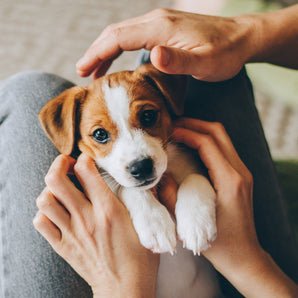There’s nothing more exciting than bringing home a baby puppy! A puppy represents a new beginning and lots of fun adventures waiting to unfold. But, we often find that the expectations of new puppy owners don’t always align with the reality of being new puppy owners.
Don’t set yourself up for disappointment
Puppies are puppies. They are a lot of work. There are no two ways about that - especially when you’re determined to do it right! I currently have a new puppy myself, and it’s almost like having a second full-time job!
If you’re not prepared to take the time it takes to establish a solid relationship, good leadership, and to help your puppy learn to listen and to understand what’s expected of them, you’re setting your puppy up for failure and yourself up for frustration and bitter disappointment.
Managing your expectations
When it comes to dealing with puppies, we want to have high expectations. But, those expectations have to be realistic based on the age of the puppy, their life experiences, the amount of training they’ve received and their level of understanding. Many people struggle to accept and/or understand the fact that development takes time and that things can be a bit messy/challenging in the beginning and as the pup moves through different developmental periods. We simply cannot expect a young, untrained puppy to behave in the way a well-trained adult dog would behave.
Crate training
Despite the fact that dogs are denning animals by instinct, many puppies will protest (some much more so than others) when they’re put into a crate and the door is closed. But, when you think about things from the puppy’s perspective, it’s understandable. Everything they’ve known about life in their short time is suddenly different when they arrive in their new home. It can take some getting used to! Not only are the environment and situation new, but they’re also away from mom and litter mates. It can take time for a puppy to learn to happily accept their crate and to be relaxed, calm, and quiet while crated. While in the litter with mom and litter mates, puppies quickly learn that when they fuss, someone comes running in response. So, it stands to reason that when we crate a puppy, it will fuss in the hopes of attracting attention. Our job is to help the puppy learn that it is quiet, relaxed behaviour that will be reinforced with attention and the opportunity to possibly be released from the crate.
House training
Have the clean-up supplies ready! Puppies WILL make some mistakes as they’re learning. Despite your very best efforts to manage the puppy well by crating when you’re unable to supervise and taking the puppy outside regularly to relieve itself, accidents will happen from time to time. Making mistakes is part of the learning process. Puppies can learn very quickly that relieving themselves outside is “right”, but it can take some time for them to learn that relieving themselves inside is “wrong”. The key to success lies in supervision! You need to be present to give your puppy good information with the proper timing when they have an accident inside. In other words, you need to catch your puppy in the act of making the mistake in order to let them know they’ve made an error. With appropriate feedback from you, the balance of mistakes will shift to successes over time.
Sleeping habits
While some people are lucky enough to have puppies that sleep through the night from the get-go, many people are not so lucky. You can expect that you might have a few interrupted nights of sleep, in the beginning, compliments of your new pup. A new sleep routine in a new home can take some time to get used to. But, within a week or so, you should find your pup sleeping through the night.
Eating habits
Don’t be surprised or overly concerned if your new puppy isn’t digging into their meals or isn’t willing to engage in training with treats right away. When puppies are still settling in, their appetite can be lacking. It’s not unusual for even the more food-motivated breeds to require some time to adjust before they begin eating well and working for food rewards. Resist the urge to cater to them by offering different types of food to tempt them. By catering to them, you’ll create a picky eater in no time. Once they settle in, they’re likely to find their appetite again.
Confidence
Some puppies are confident by nature, while others can be very unconfident. But, even the most confident of pups can experience moments where they suddenly lose confidence and can struggle at times. When puppies first come to their new home, you can expect that the pup might be unsure or even afraid of certain things. Be prepared to give your puppy time to settle in and make sense of their new surroundings and all of the changes that come along with it.
Basic listening skills
Teaching a puppy how to listen takes time, effort, repetition and skill on your part as the trainer. Puppies do not come pre-programmed to listen to you. You need to invest the time to teach your puppy how to respond appropriately to their name, come when you call them, sit, lie down and stand on command, accept having you hold their collar for control, be relaxed and calm while you groom them, leave things when told to do so, drop things on command, settle when asked, etc. The list goes on! But, that time and effort you invest in your puppy WILL pay off.
Nipping
Living with a puppy can sometimes be like living with a land shark. Puppies have sharp, needle teeth - and they aren’t above using them. While it is normal puppy behaviour to use their mouths to explore and play, it’s important to teach them that using their teeth on our skin or clothing is not acceptable and will not be tolerated. The sooner you’re able to effectively address and put a stop to the nipping, the better.
Settling
Young puppies typically have 2 gears: on and off. Many people are often frustrated by the fact that puppies, when awake, are a going concern and that they don’t just “settle” and relax when out of their crate. It’s important to remember that puppies don’t self-regulate the way an adult dog will - they don’t simply “conserve energy”. Puppies tend to be on the go until they crash from exhaustion. But, before they crash, they tend to become over-tired, over-stimulated and easily aroused. They can become quickly frustrated and unable to process information well. This can spell disaster for the puppy and can lead to a lot of upset and frustration for the owner. But, in training, there are things that you can do to help your puppy learn to find their off-switch.
Set yourself AND your puppy up for success!
People often underestimate the power of early training. A puppy’s brain is fully developed by the time they are 7 weeks of age. Rather than waiting until your puppy is giving you a run for your money, begin training right away. Teach your puppy that you’re a fair and loving leader who provides good direction in life, teach your puppy how to listen to you, and teach your puppy how to live up to your expectations. Understand your puppy. Learn how to communicate effectively with your puppy. Invest the time it takes. It will all be worth it!
Happy Training!
Instructor Robbie

Hi! I’m Robbie Stevenson and I started training at McCanns as a student in 1995 when I discovered my passion for dog (and human!) training. I then joined the McCann team as a full time employee in 1997 and taught classes for 14 years. After leaving McCanns when I had to move away, I rejoined the team in 2020. I’m now the Online Program Development Manager for McCann Professional Dog Trainers. I love writing about anything related to dog training as well as online learning after my own personal experiences as an online student studying horsemanship. I currently have 2 Border Collies (Spright and So) who keep me very active and busy with lots of fun activities when I’m not working

